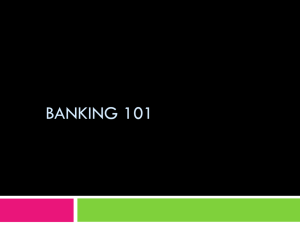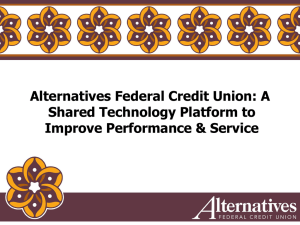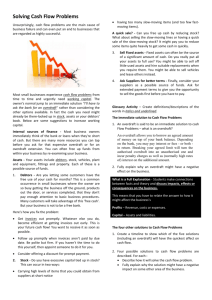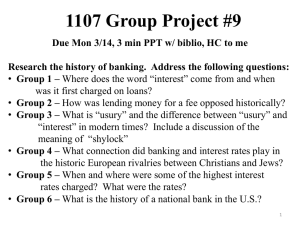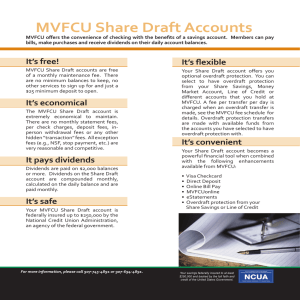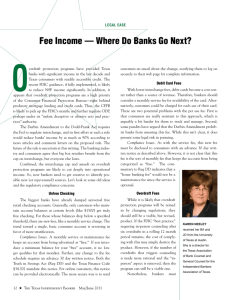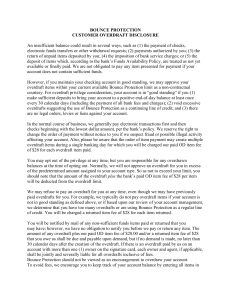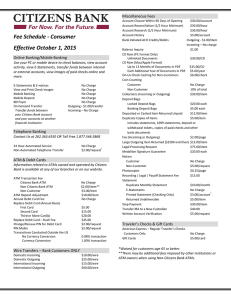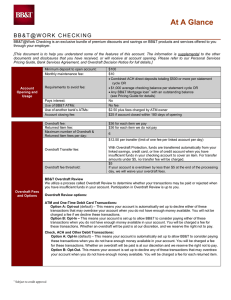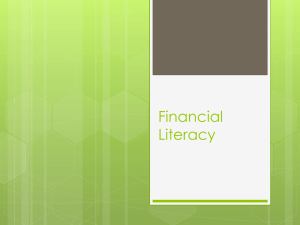Money Matters
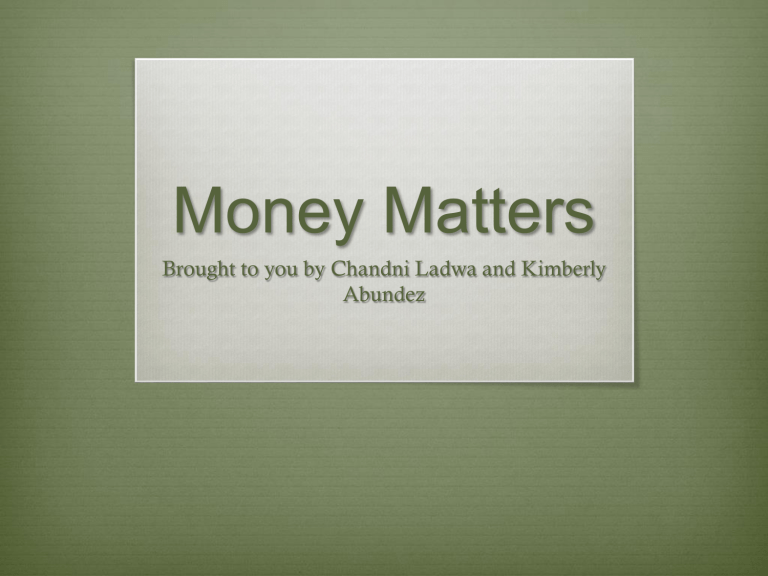
Money Matters
Brought to you by Chandni Ladwa and Kimberly
Abundez
Introduction
The transition into adulthood means taking on more responsibilities, one of them being managing money. You will now be able to sign legal contracts, open bank accounts, and apply for loans independently. Also, know that if you are 18 years of age, your parents are no longer obligated to aid you financially if you are struggling. Therefore, before making any financial decisions, it is important that you take note of benefits, pitfalls, rules and restrictions.
What is a contract?
An agreement between two or more parties
May be oral or written and are always legal.
Examples: Large purchases such as a new car, apartment lease, as well as insurance policies and terms of a new job.
Who can make a contract?
Anyone age 18 or over who is competent.
Precautions: read completely before signing any contract, do not sign until you fully understand agreement, talk to other party about modifying a removing a part you do not agree with, do not leave any blank spaces, keep signed copy for your records.
What happens if a contract is broken due to misunderstanding?
There is generally no excuses
Consequences and options:
-Sued, required to appear before judge, pay judgment plus interest, sometimes other side’s costs
-If it involves an unpaid debt, an agreement could be to where you are able to pay overtime. Make sure it is in writing.
-File for bankruptcy which may give you a fresh start but could result in bad credit rate making it hard to receive loans.
What should I ask before opening a banking account?
Available accounts For any bank product online, be sure it is a legitimate financial institution
Which account best suits you
Interest rate, fees, services
Call FDIC(Federal Deposit
Insurance Corp.:1-877-275-3342 or visit Bank Fund at
FDIC.gov(can be found when you click Consumers and
Communities)
Online banking and overdraft programs
Minimum balance
The difference between an ATM card and a debit card
ATM-used for basic banking like making deposits or withdraws. Simply insert card into an ATM machine and enter PIN. If transaction includes fee, you must be given option to cancel.
Debit- Electronically transfers funds from cardholder’s account.
-is used more often than credit card, cash, check
-generally does not require
PIN, be careful of thieves or losing your card
What happens if I spend more money than
I have in my bank account?
Purchase may be declined unless agreed to bank overdraft coverage and fee
If you did not but bank approves transaction, they cannot charge overdraft fee
Writing a check with insufficient funds may result in the return of the check to whomever attempted to cash it who could charge you up to three times the amount of the check in penalties. Or, bank will cash check, require you to make a deposit, and charge a fee
Researching your options can prevent from too many overdraft charges/fees.
Some banks can also send alerts when balance is low.
What is a prepaid reloadable card?
Funds are loaded onto the card in advance.
It is more convenient and allows students to avoid the risks of overspending with associated credit cards.
Make sure you understand the terms and risks IDIC officials state the prepaid cards have more fees than protections when compared to traditional bank accounts
Why not use a credit card instead of debit, prepaid, checks, or cash?
A well managed credit card can help you build good credit.
However, being under 21 makes it harder to acquire a credit card. (you need a co-signer or proof that you can pay off the debt).
Must pay interest and other fees to use them
Late payments mean penalties.
There are monthly minimum payments, however you would be paying more than what you borrowed.
What should I do if I lose a credit card?
Report the loss to the bank, and anything over $30 charged, you will not be responsible.
What is a credit report?
Summary of your debts and when you paid your bills
It is collected and stored by companies called credit businesses which make the information available when taking out loans or etc.
Right to one free credit report every 12 months
How long does it take to fix bad credit?
It depends on your past problems
Can be filed up to seven years, even 10 for bankruptcy
What is collateral?
Item of value that is accepted by the lender as back-up payment in case you are unable to repay your loan
Can a lender have different rules for making loans to women, men, or minorities?
No, lenders can only make distinctions based off of credit rating.
